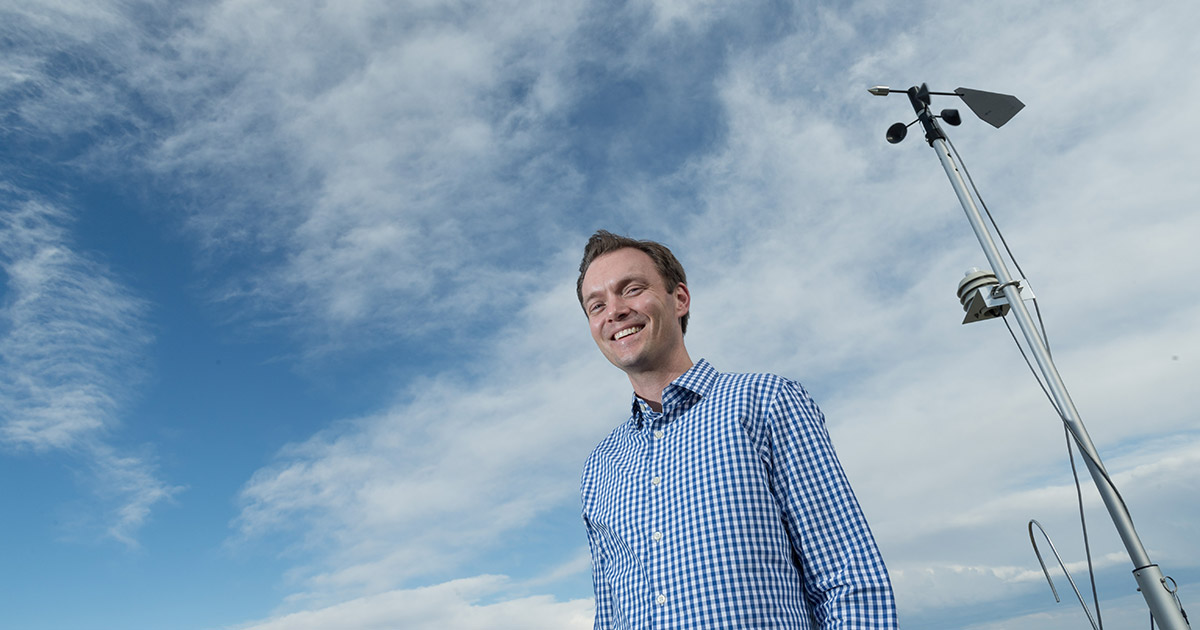
Russ Schumacher, associate professor in the Department of Atmospheric Science, became Colorado State Climatologist Oct. 6. Photo credit: John Eisele/Colorado State University Photography
Most of Russ Schumacher’s atmospheric science research career has centered on weather extremes: heavy rain, flash floods, snowstorms and the like.
This knowledge and experience makes Schumacher a perfect fit for the job of Colorado State Climatologist. Take the flood of 2013, the Windsor tornado of 2008, or the perpetual threat of drought and wildfire in summer months.
An associate professor in the Department of Atmospheric Science at Colorado State University, Schumacher became Colorado State Climatologist Oct. 6. He’ll continue in his academic role while taking on the added, vast responsibility of key statewide climate expert and spokesperson.
“Part of our mission is to help people understand what sort of extreme weather we need to prepare for and be cognizant of here in Colorado – which of course varies hugely from one part of the state to the other,” Schumacher said. “Yet the majority of our work deals with day-to-day aspects of measuring and understanding our state’s unique weather and climate, from normals to extremes.”
As State Climatologist, Schumacher will lead the Colorado Climate Center, the CSU-based office that provides climate monitoring and research for the benefit of scientists, educators and the general public. The center’s long list of activities includes drought monitoring for the National Integrated Drought Information System; operation of the Colorado Agricultural Meteorological Network; and administration of the Community Collaborative Rain, Hail and Snow Network.
Filling big shoes
Schumacher succeeds Nolan Doesken, who has served as Colorado State Climatologist since 2006 and as assistant state climatologist for close to three decades prior. Schumacher says “it will never be possible to fill the shoes of my predecessor,” who built up the visibility of the Colorado Climate Center and created a vast network of stakeholders – from farmers to government officials to meteorologists.
What Schumacher brings to his new position is an extensive research background, teaching prowess, and intimate familiarity with Colorado’s climate.
Coming from the academic side of weather and climate, Schumacher hopes his dual role can forge stronger connections between the Department of Atmospheric Science – his academic home – and the activities of the climate center. That might include more integration of department graduate students with climate center outreach and research, for example.
Established roots
Schumacher’s CSU and Colorado roots are well established. He first came to Colorado as a graduate student in the Department of Atmospheric Science in Fall 2001, completing his M.S. in 2003 and Ph.D. in 2008. He became a faculty member in 2011 following a postdoctoral stint at the National Center for Atmospheric Research in Boulder, and two years as an assistant professor at Texas A&M.
Schumacher received a National Science Foundation CAREER award in 2010, and he is editor of the American Meteorological Society’s Monthly Weather Review. His research is in mesoscale meteorology; mesoscale convective systems; weather analysis and forecasting; climatology of precipitation; precipitation extremes; flash floods; and societal impacts of weather.
Schumacher’s expertise matches his enthusiasm for the weird, wacky world of Colorado weather.
“The weather and climate of Colorado is fascinating, it’s diverse – and it’s hard to understand sometimes,” he said.